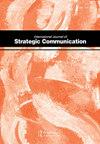“不幸的是,我们没有任何进一步的信息可以补充”——公共卫生Facebook页面上的战略脱离
IF 1.9
Q1 COMMUNICATION
International Journal of Strategic Communication
Pub Date : 2022-05-27
DOI:10.1080/1553118X.2022.2041021
引用次数: 1
摘要
摘要在新冠肺炎大流行期间,与公众的沟通一直是国家行为者关注的焦点。一个重要的问题是如何最好地利用社交媒体,确保他们向公众提供的建议和建议得到充分采纳。关于这种战略沟通目标,以前人们非常关注社交媒体上战略沟通的参与、互动和对话形式。然而,本文关注的是一个文献中没有太多讨论的方面:一个组织可能由于缺乏资源或对话停滞而不得不脱离的需求。本文以斯堪的纳维亚公共卫生当局通过其Facebook页面进行的交流为例,对相关帖子进行了主题分析,并对员工进行了定性采访,认为这些机构使用了三种脱离策略:1)矛盾,2)元话语脱离,3)通过同情/同理心脱离。基于此,我们考虑了脱离接触的战略潜力,并讨论了脱离接触战略是否可以被视为公共卫生组织危机沟通的合法工具,使其能够实现确保公民支持和遵守当局建议的双重目标。本文章由计算机程序翻译,如有差异,请以英文原文为准。
“We Do Not Have Any Further Info to Add, Unfortunately” – Strategic Disengagement on Public Health Facebook Pages
ABSTRACT During the COVID-19 pandemic, communication with the public has been a central concern for state actors. One important question has been how to best use social media to ensure the sufficient uptake of their advice and recommendations to the public. With regard to such strategic communicative aims, a significant amount of attention has been previously devoted to the engagement, interaction, and dialogic forms of strategic communication on social media. This paper, however, focuses on an aspect that has not been discussed much in the literature: the need an organization might have to disengage due to a lack of resources or when a conversation has stalled. Using the communication that Scandinavian public health authorities carried out through their Facebook pages as cases, this paper employs a thematic analysis of the associated posts and qualitative interviews with employees to argue that these institutions use three disengagement strategies: 1) contradiction, 2) meta-discursive disengagement, and 3) disengagement through sympathy/empathy. Based on this, we consider the strategic potential of disengagement and discuss whether disengagement strategies can be considered legitimate tools for public health organizations’ crisis communication that can allow them to achieve the dual aim of ensuring citizens’ support for and compliance with authorities’ recommendations.
求助全文
通过发布文献求助,成功后即可免费获取论文全文。
去求助
来源期刊

International Journal of Strategic Communication
Social Sciences-Sociology and Political Science
CiteScore
3.40
自引率
0.00%
发文量
39
期刊介绍:
The International Journal of Strategic Communication examines the philosophical, theoretical, and applied nature of strategic communication, which is “the purposeful use of communication by an organization to fulfill its mission.” IJSC provides a foundation for the study of strategic communication from diverse disciplines, including corporate and managerial communication, organizational communication, public relations, marketing communication, advertising, political and health communication, social marketing, international relations, public diplomacy, and other specialized communication areas. The IJSC is the singular forum for multidisciplinary inquiry of this nature.
 求助内容:
求助内容: 应助结果提醒方式:
应助结果提醒方式:


